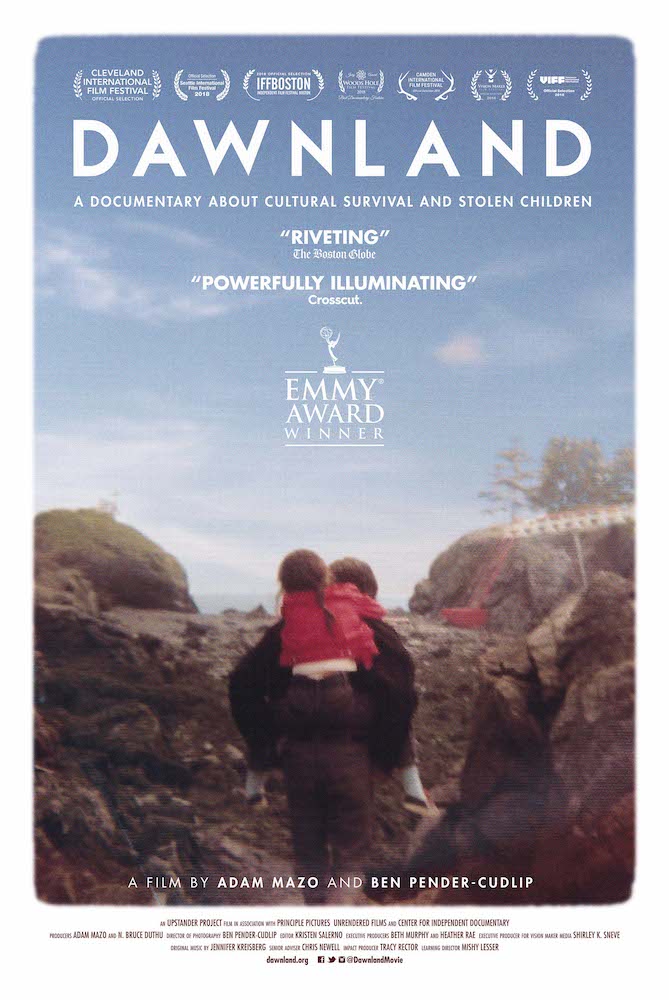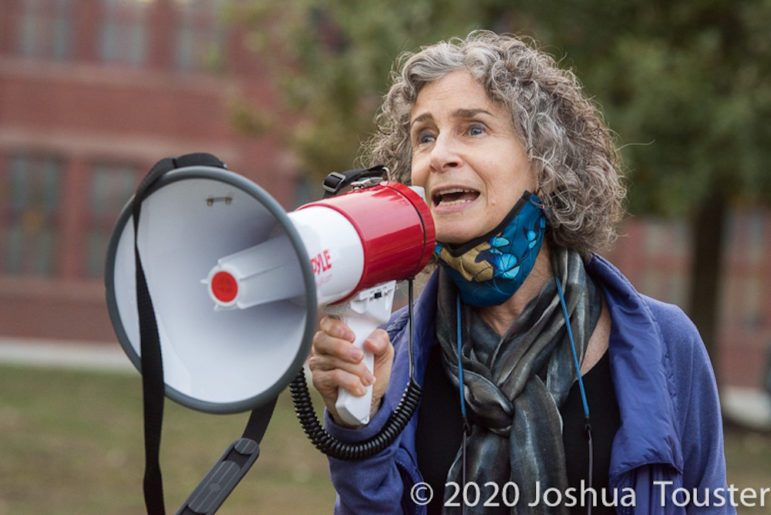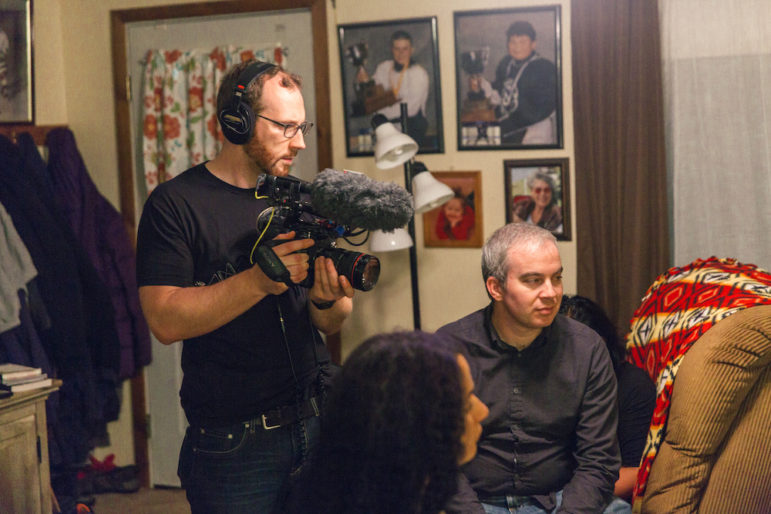
A Watertown resident teamed with a local filmmaker to use documentary film and educational materials with the goal of dismantling hurtful and stereotypical ideas, as well as teaching people about the experiences and history of Native Americans that many do not learn in school.
Mishy Lesser, an educator from Watertown, co-founded the Upstander Project with local filmmaker Adam Mazo. The project has made several films, including the Emmy-award winning Dawnland, which will be shown in November on PBS, including locally on the World Channel.
Eleven years ago, Lesser met Mazo as he was preparing to visit Rwanda to make a documentary film, and wanted to figure out how it could make an impact.
“We met, and had a long conversation about Rwanda, what he’d want a larger audience to learn and who he wanted to reach,” said Lesser.
In 2009, the pair founded the Upstander Project to produce documentary films and conduct professional training to help teachers dismantle hurtful and stereotypical ideas. At first, the focus of the training was Mazo’s film, Coexist, about post-genocide Rwanda.
The project has worked with students and educators from a range of levels, from middle school to graduate school. The messages about Rwanda had a strong connection with middle and high school students, she said.
“To give them an understanding of genocide we first get them to talk about social and emotional experiences they have had in school with othering and stereotyping and name calling, all of which can be identified in the earliest stages of genocide,” Lesser said. “I’m not suggesting stereotyping, name calling and othering automatically lead to genocide, but in certain circumstances they are identifiable in the early stages.”

After focusing on the genocide in the African nation, Lesser decided the project should make a change.
“I began to feel morally uneasy teaching about genocide in a far away place, without addressing genocide in our country,” Lesser said. “One day I was listening to WBUR, and heard about the recent creation in Maine of a truth and reconciliation commission, between the Wabanaki people and the state over its child welfare system’s alarmingly high rate of removal of Native American children from their families and placement in foster care.”
For centuries, Native American children were removed from their parents, and most lost connection with not just their kin, but their language, culture and heritage. The practice lasted into the 20th Century.
The Upstander Project got in touch with those involved in the Maine Wabanaki-State Child Welfare Truth and Reconciliation Commission, Maine-Wabanaki REACH, to ask if they would allow the Project to make a film about the effort.
“They took their time vetting us, and after a few months they allowed us to bear witness to their process and allow us to make a documentary film,” Lesser said.
While many did not want to be filmed, some agreed to be part of the documentary films directed by Mazo and Ben Pender-Cudlip. Lesser said the archives of the Maine-Wabanaki REACH are housed at Bowdoin College in Brunswick, Maine.
The first film made about the Wabanaki was First Light, a 13-minute documentary made in 2015. The Wabanaki are known as the People of the First Light because they are so far east that they are the first to see the sunrise, Lesser said.
In 2018, Mazo and Pender-Cudlip presented Dawnland, which provides a glimpse inside the first government-sanctioned truth and reconciliation commission in the United States focused on issues of importance to Native Americans. The film’s editor, Kristen Salerno, was born and raised in Watertown, Mazo said.
Dawnland was released as a feature-length film, and later a 54-minute version was made and broadcast nationally as part of PBS’s Independent Lens series. This version will air several times in November on PBS World (see more info below).
In 2019, Dawnland won the National News & Documentary Emmy Award for Outstanding Research and received a nomination for Outstanding Score. It also won the Jury Award for Best Documentary at the Woods Hole and Buffalo International film festivals, and the 2019 Media for a Just Society Award for Best Film.
“I feel like the Emmy was more a recognition than anything else, a recognition of the Wabanaki people, their story and their work telling their story, which they granted us permission to share,” Lesser said.

Lesser wrote a 12 lesson teacher’s guide to go with Dawnland, which has been downloaded by thousands of teachers, she said.
The group also started the Upstander Academy, which was piloted for three years at the Dodd Human Rights Impact (formerly the Dodd Research Center) at the University of Connecticut. In 2019 the Upstander Academy moved to Boston, Lesser said.
The Academy was run in person but this year, due to COVID-19, it was done digitally. Plans for next summer include a hybrid model, which would allow for some in-person attendance with the rest participating remotely.
Through her work with the Upstander Project, Lesser said she has also learned a lot about Native American history and their experiences. The history is much different than what is typically taught in school, she said.
“We help teachers learn that the history of this land did not begin with the arrival of the Pilgrims in 1620,” Lesser said. “Many do not know that the area called Plymouth, was the Wampanoag village of Patuxet.”
The indigenous people of the New England area date back 11,000, possibly 13,000 years, Lesser said.
“What the false narrative does is reinforce the erasure of native people from a place, whether Massachusetts or more broadly,” Lesser said.
Those interested in learning more about the experience of Native Americans can watch the Upstander Project’s films.
“I would love if the people of Watertown who are curious about this watch First Light, when they gather in person or digitally on Thanksgiving, to see the reality of the conditions that the Native Americans in New England living today,” Lesser said.
Those who are interested can watch First Light at upstanderproject.org.
Dawnland will air on the PBS World Channel (RCN Channel 94, Comcast Channel 956, and broadcast channel 2.2) beginning on Nov. 3. The air dates are:
- Tuesday, Nov. 3 at 7 p.m.
- Wednesday, Nov. 4 at 10 a.m.
- Saturday, Nov. 7, 2020 at 11 p.m.
- Sunday, Nov. 8 at 10 p.m.
The movie can also be viewed on PBS Passport through November for Native American Heritage Month.
This is awesome. Especially in light of Watertown High’s recent and right decision to get rid of their original Raiders image. Looking forward to seeing this film and to learning more about our nation’s history of genocide. Genocides are occuring now in various parts of the world. We are doomed to repeat these horrors if we do not remember, own, and put a human face to them. G
These 2 films are magnificent yet devastating tributes to the “First Nations” people who protected and cherished the lands on which we stand. All over America, but especially here in Watertown, we have much to learn about the painful, less known legacy of how those who lived and thrived here before us disappeared. We are indeed blessed to have Mishy and her team in our midst!